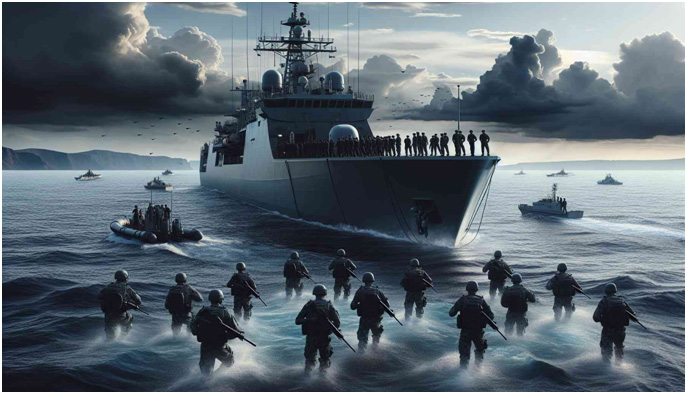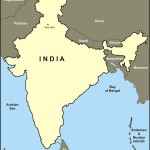The Indian Ocean is gaining greater importance due to multiple geopolitical developments and competing interests of regional and global powers. With the spike in unsettling actions like piracy and disruption of shipping lanes, there is a greater need to enforce order at sea. Indian Ocean Rim Association can play a significant role in bringinglike-minded nations to address this demanding challenge.
Power Projection
Lying to the South of India, West of Australia and East of Africa the Indian Ocean is the world’s third-largestocean. It covers an area of 70.56 million Square Kilometre with vast minerals and oil reserves. What makes the Indian Ocean a strikingly critical part of global geopolitics is the value of the economy and the power projection mechanics it encompasses. Trading routes merging from the Strait of Hormuz to the Malacca Strait in the Arabian Sea and South China Sea (SCS) make it the world’s busiest trading corridor. Almost80% of global tradeis carried by roughly a lakh of shipsevery year in the region.
The emergence of the idea of the Indian Ocean as a Region holding the key to common prosperity and assurance for security goes to its founding members India& South Africa. Indian Ocean Rim Association (IORA) was originally conceived as the Indian Ocean Rim Initiative in March 1995 with seven members. The organisation was later named Indian Ocean Rim Association for RegionalCo-operation (IOR-ARC) with 14 members in March 1997. IORA now boasts of 23 members and 11 dialogue partners that include all the great powers today, making it a highly engaged and influential global body.
IORA Charter
As the economic interest in the region grew so were the new challenges. The busy sea lanes became preferred spots for piracy. The coast of Somalia gained notoriety for sea pirates and many high-profilehijackingsin the high sea. Indian Navy foiled back-to-back two hijacking bids in less than 24 hours on 30th January 2024 near the coast of Somalia. These incidents not only increased the transit risks but pushed the insurance costs soaring sky high. The double whammy of risk and cost escalation while still being a preferred route for shipping has subsequently made the Indian Ocean Region (IOR) an indispensable proposition for nations.
The IORA charter does indeed identifyits prime objectives in a similar fashion. It laid down six key parameters for cooperation and focus areas which included Maritime Safety &Security, Disaster Risk Management,and Blue Economy among others. IORA has adopted a remarkable charter that not only puts focus on economic prosperity but also lays stress on the need for security guarantees. This is unlike most global organisations which have come together just as a celebrated business module.
The security significance is also very intriguing for the Indian Ocean,the connection with the Arabian Sea to its North-West and the South China Sea to its North-East makes it appear a raging bull with two sharp horns. The waters around both the Arabian and South China Seashave become heavily militarised due to global players’ push to ensure domination. It’s now the only region in the world to have the active military presence of all the major powers US, China, India, Russia, France, and the UK. The great Asian rivalry between India and China is also an unmistakable component of the region, making it an unparalleled subject of interest among military strategists, and scientific and business communities.
Proactive Engagement
The geographic disposition ofIOR is highly significant for India which holds the largest coastline of this ocean than anyone else. Many believe the naming of the Indian Ocean is closely inspired by India itself, which sits at the head and center of the ocean. This not only makes India the biggest economic claimant with massive EEZ but also a key stakeholderin enforcing security andrules-based conduct in the IOR.
On India’s part, it has indeed undertaken the responsibility and hasserved as a resident power. It has very strong historical and cultural connections and a sizable Indian diaspora in many of these countries.Historically, the dispersion of people from India and the formation of Indian Diaspora communities is the result of different waves of migration over hundreds of years driven by a variety of reasons: slavery under mercantilism, indentured labour under colonisation, and guest work programmes post-colonialism.India has been actively working to forge close diplomatic ties with all the countries in the region. A proactive diplomatic engagement becomes an important necessityfor laying down certain ground rules for ensuring adherence to accepted global norms.
India has maintained a strong military presence, closely coordinating with other regional navies. India has been overseeing the safe transit of commercial containers, undertaking anti-piracy operations in the high sea, and preventing illegal, unreported & unregulated exploitation of the ocean. India has proved to be the preferred partner for Westernpowers and has been acting as a net security provider in the region with its Navy carrying the onus of being first responder.
The majority of Western countries have maintained their naval presence in the IOR which further amplifies the intricate security dynamics. The US has stationed its fifth fleet in Bahrain, France has itsaircraft carrier Charles de Gaulle,in 2021 UK deployed its largest aircraft carrier HMS Queen Elizabeth, Russia has placed part of its Pacific Fleet in the region whereas,Australia’s Fleet Base West looks after the Indian Ocean. Lately,China has also jumped in under the cover of protecting commercial interests and so-called oceanic studies. What is remarkable though is the way this entire region is being managed despite so many competing powers and conflicting interests.
Closer Partnerships
The major chunk of credit for the management of IOR should be given to India’s measured power projection and its astute diplomacy, working with the spirit of accommodation. Contrast India’s subtle engagements in IOR with the chaos SCS is witnessing.In an almost similar scenario where China considers SCS as its backyard but deniesothers their rightful claims on respective EEZ, disputing historical territorial sovereignty and proactively militarising sensitive islands.
China has been IORA’s dialogue partner since 2001 and has continuously pushed for closer partnerships with countries of the region. Its economic push and a vision of the maritime Silk Route are entangled with greater ambitions of gaining a foothold for its military manoeuvres. It pressed for berthing rights for its submarines in Sri Lanka,the moment there was a payment default on loans.
China’s continued aggressive involvement in the region and its statednon-adherence to globally recognised UNCLOS makes for an already complex arrangement even more complicated. An existing mechanism that has delivered and working fine is now staring at a scenario where conflicts and consensus are tilted towards individual interests rather than spaceforthe common good. The desire of major powers to create proxies within IORA member states will lead to a state of stalemate on key issues of cooperation in the very near future.
India as a major stakeholder in this maritime domain needs to work towards a better understanding of the region. The Indian Navy’s 2015 ‘Maritime Security Strategy’ lays as much stress on this aspect. India has to shrug off any remaining strategic inertia and educateits IORA partners about the pitfalls of varying too much from the agreed common agenda. The region needs to cooperate on matters strictly relating to the governance mechanism of IOR. India’s diplomatic, economic, and security push should be coupled with strategic conversations with other global players to prevent any misconceptions. This calls for sturdy diplomatic initiatives from India to unlock ambitious goals of a multi-billion dollarBlue Economyand a stable security framework for the IOR.





